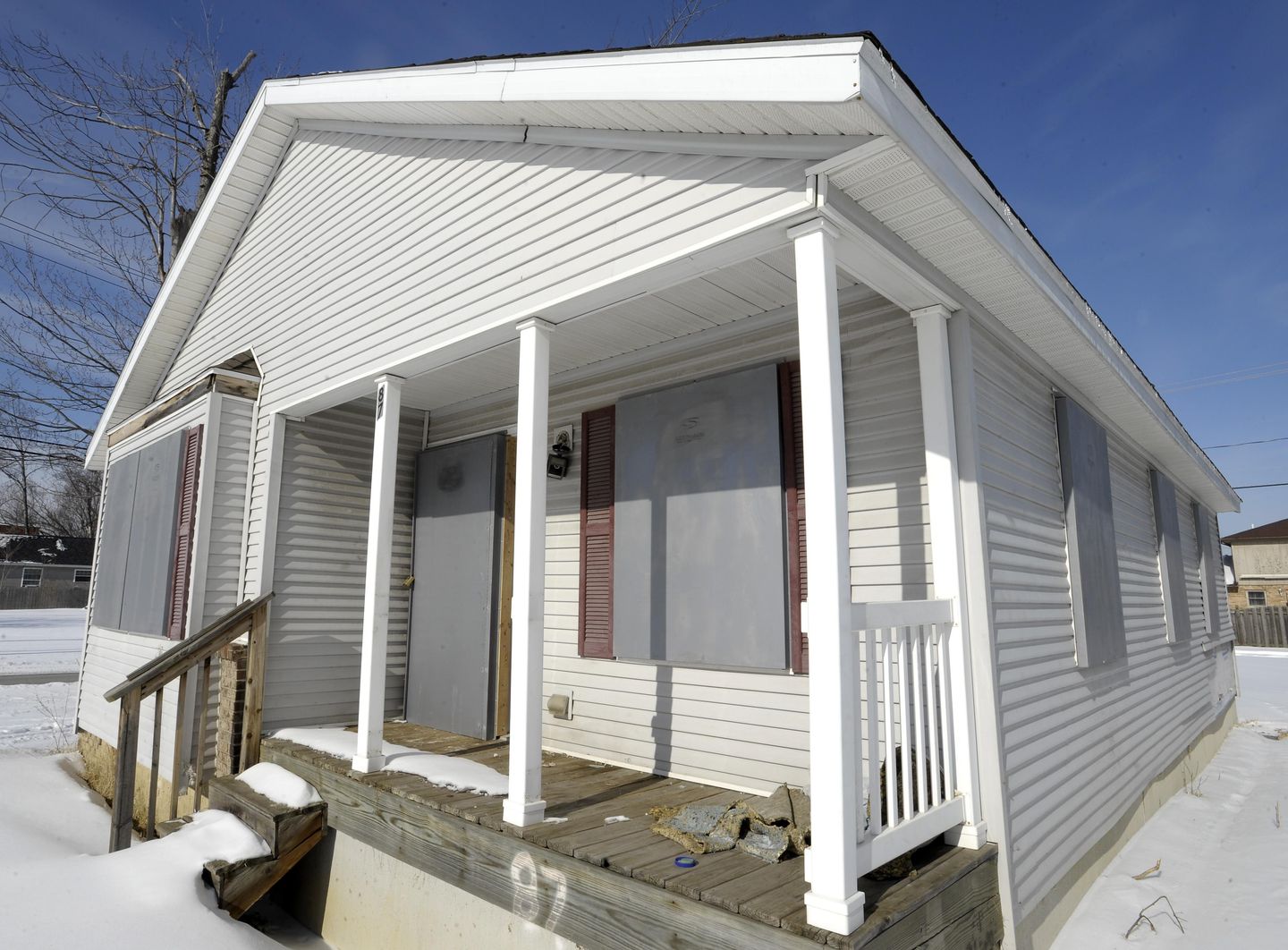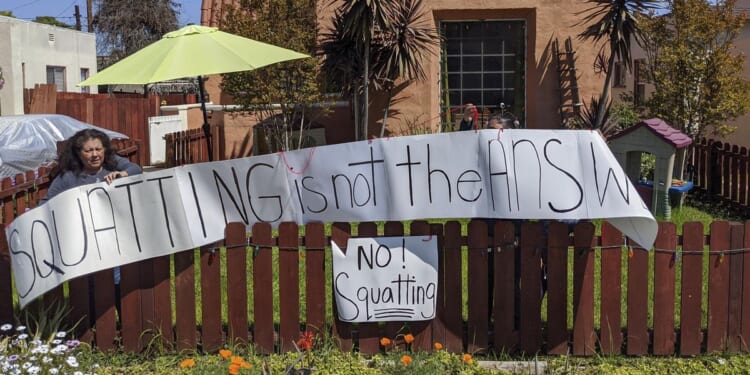
Lawmakers in states across the country are belatedly moving to restore the property rights of owners who have been forced into lengthy and often costly court battles to reclaim their houses from squatters exploiting pandemic-era tenant protections to take over empty houses.
Savvy scammers invoke squatter’s rights by entering unoccupied homes and falsifying residency documents. The process can suck rightful homeowners into a monthslong eviction battle while the squatters sell off appliances and turn houses into drug dens, leaving landlords with thousands of dollars in repairs and lost rent once all is said and done.
The formula for stealing a house is so foolproof that one illegal immigrant became famous on social media by sharing his step-by-step guide to “invading” vacant homes.
Now state lawmakers are reclassifying those self-proclaimed “tenants” as intruders and giving homeowners more tools to protect their property.
“People are afraid … especially our elderly constituents,” said Jessica Scarcella-Spanton, a New York state senator who represents parts of Staten Island and Brooklyn. “We have a lot of constituents who maybe go to Florida for a month or so in the winter, they’re afraid to leave their home behind. Some people have even brought up that they get worried about having a visitor for an extended period of time if it’s not a family member who they really trust.”
New York City had some of the most robust squatters rights in the nation before Gov. Kathy Hochul, a Democrat, excluded squatters from tenant protections when she signed the state budget agreement last month.
Before Ms. Hochul cemented the changes, a squatter in the Big Apple only needed to stay in a house or apartment for 30 days before they could be legally recognized as a resident.
The old standards caused multiple conflicts this spring alone in New York City.
A couple of teen squatters were accused in March of beating a Manhattan apartment owner to death before they were nabbed in Pennsylvania. A Queens homeowner was arrested at her late mother’s million-dollar house that same month for trying to change the locks on a group of squatters.
Gun-toting illegal immigrants were arrested after having eight people squatting inside a basement unit in the Bronx. And this spring, a squatting duo tried to use a Shake Shack receipt as proof of residency at a house in Jamaica, Queens.
State lawmakers based in the city proposed a flurry of bills to address the issue, with some seeking to define what a squatter is while others look to put more pressure on the vagrants to prove they live there.
Ms. Scarcella-Spanton was among those lawmakers pushing to disassociate the terms “squatter” and “tenant” so the intruders would lose major legal protections.
New York property law now defines squatters as people living in a house without the proper documents. It allows local police to get involved when there are home invaders without forcing property owners to go through the eviction process.
Real estate agents who came across the squatters said those changes couldn’t come soon enough.
Karen Hatcher, the head of Sovereign Realty Group in Atlanta, works in what one trade group calls the nation’s housing market most affected by squatters.
The National Home Rental Council said the Atlanta area had about 1,200 squatting incidents in 2023 — nearly three times as many as the next hardest-hit area, the Dallas-Fort Worth metroplex, which saw 475 squatters last year.
Horror stories abound in Atlanta: One real estate agent told local media that a band of squatters sold off the appliances and left “feces everywhere” inside a house that had been “move-in ready.”
An employee for a housing investment firm was shot by a squatter last spring in the Atlanta suburb of Lithonia, according to Bloomberg News.
Former property manager Tim Arko told multiple media outlets he lost more than $100,000 when squatters took control of his rental property last year. One of the “tenants” even flashed a gun at Mr. Arko during their first interaction. Mr. Arko came back armed with his own rifle and wound up being arrested by police.
Those violent and costly run-ins are why Ms. Hatcher with Sovereign Realty called a new Georgia law a “game changer.”
“They are not tenants, they are criminals,” Ms. Hatcher told The Times. “We have to have a clear delineation within our law that specifies that you can’t just break into a property and be automatically considered a tenant.”
The new law treats squatters as trespassers rather than as tenants. The accused squatter would have three days to provide proof of residency or risk facing criminal charges.
Georgia’s House and Senate passed the bill unanimously, and the law took effect immediately after it was signed late last month by Gov. Brian Kemp, a Republican.
Florida has been the most proactive in fighting squatters.
Gov. Ron DeSantis in March signed into law a bill similar to Georgia’s, allowing the local sheriff’s office to escort accused squatters and their belongings off the property. Those who refuse can be arrested for trespassing.
The law was welcomed by Rose Kemp, president of the Orlando Regional Realtor Association, which trade groups say is the third-hardest hit area in the country with squatters.
Ms. Kemp couldn’t speak to statistics on squatting in Orlando, but she said she knows multiple real estate agents who have had trouble with intruders — including herself.
Back in 2021, one of her clients rented out a home to a retiring military veteran from out of state.
But when the new tenant arrived in Florida two weeks after signing the lease, the home’s lockbox was missing. Ms. Kemp said the tenant peaked into the home and saw trash and food strewn about.
A family of squatters had moved into the property, Ms. Kemp said, and even brought their children with them. Ms. Kemp said her client ultimately lucked out — police noticed a broken window in the back of the property and were able to arrest the adults for trespassing on the spot.
What Ms. Kemp said was most alarming wasn’t the brazen intrusion, but discovering a checklist of nearby homes that the squatters had scoped out.
“These were professional squatters with multiple addresses that they have found in the area. All of these different addresses with little notes, checkmarks,” Ms. Kemp told The Times. “They had been basically vetting to see where to go.”
Property ownership took a hit during the COVID-19 pandemic, when many jurisdictions imposed moratoriums on evictions with other tenant-friendly protections to forestall a wave of homelessness in the midst of an economic shutdown. Some cities and states extended and reextended those programs, and along the way, scammers learned how to exploit laws to live rent-free.
But the root of the problem dates to the mass of foreclosures that came from the housing bubble that popped in 2008, according to Pacific Legal Foundation’s Mark Miller.
The senior attorney said a dearth of newly built homes, thanks in part to regulations that limit home construction, is driving up costs and pricing people out of the housing market.
It has created squatters such as the kind that Ms. Hatcher in Atlanta has come across — working people who, whether because of financial reasons or from having a criminal record, wouldn’t qualify for a lease. So they resort to squatting.
But Mr. Miller at Pacific Legal said he was encouraged by the push to enforce property rights. To him, it’s the ground that a stable society is built on.
“If our governments are not going to protect property, then we have to elect people who will, because otherwise, people start to lose respect for the law — and that’s bad for everybody,” he said.












